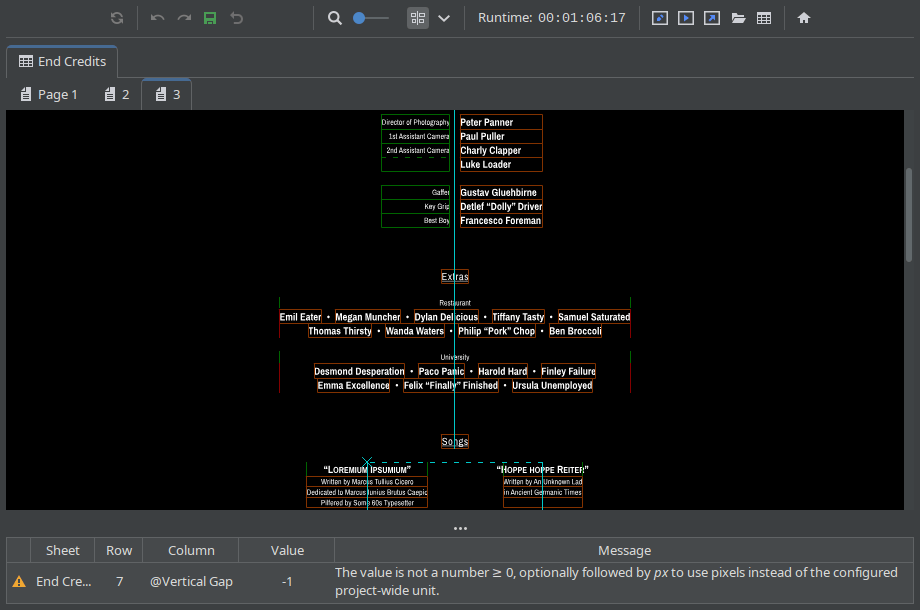If you’ve ever put together end credits for a film, you know they are laborious to assemble and a pain to get right. Altering the layout, font size, or spacing after the fact is incredibly time-consuming. And don’t even think about hitting an exact runtime requirement while circumnavigating the shimmer trap.
But there is a better way: Cinecred, a free and open source program to create credits without the pain. Cinecred reads your credits data from an Excel, LibreOffice, or Google spreadsheet, and then lets you interactively arrange and style the credits in any way you like. There’s a default template that gets you off the ground quickly, but everything can be customized down to the pixel. Use your own fonts or insert logos, pictures, or even videos. And once you’re done, check the scroll in the integrated player, before exporting it in a plethora of video and image sequence formats.
This is free and open source software.
Features include:
- Reads the raw credits data from a Credits.xls(x) (Microsoft Excel), Credits.ods (LibreOffice Calc), Credits.numbers (Apple Numbers), or Credits.csv file, or even an online service like Google Sheets.
- Live visualization – continually updates an interactive visual preview and indicates any problems with the Credits file. Optional layout guides (press the red button in the screenshot) make both learning Cinecred and styling your credits dead easy.
- Interactive styling.
- Initializes new projects with a template that covers many common use cases.
- Flexible styling system enables a wide range of layouts and designs.
- Embed media.
- Instant real-time playback at any time.
- Manifold delivery options.
- Cross-platform support – runs under Linux, macOS, and Windows.
Website: cinecred.com
Support: GitHub Code Repository
Developer: Felix Mujkanovic
License: GNU General Public License v3.0

Cinecred is written in Kotlin and Java. Learn Kotlin with our recommended free books and free tutorials. Learn Java with our recommended free books and free tutorials.
| Popular series | |
|---|---|
| The largest compilation of the best free and open source software in the universe. Each article is supplied with a legendary ratings chart helping you to make informed decisions. | |
| Hundreds of in-depth reviews offering our unbiased and expert opinion on software. We offer helpful and impartial information. | |
| The Big List of Active Linux Distros is a large compilation of actively developed Linux distributions. | |
| Replace proprietary software with open source alternatives: Google, Microsoft, Apple, Adobe, IBM, Autodesk, Oracle, Atlassian, Corel, Cisco, Intuit, SAS, Progress, Salesforce, and Citrix | |
| Awesome Free Linux Games Tools showcases a series of tools that making gaming on Linux a more pleasurable experience. This is a new series. | |
| Machine Learning explores practical applications of machine learning and deep learning from a Linux perspective. We've written reviews of more than 40 self-hosted apps. All are free and open source. | |
| New to Linux? Read our Linux for Starters series. We start right at the basics and teach you everything you need to know to get started with Linux. | |
| Alternatives to popular CLI tools showcases essential tools that are modern replacements for core Linux utilities. | |
| Essential Linux system tools focuses on small, indispensable utilities, useful for system administrators as well as regular users. | |
| Linux utilities to maximise your productivity. Small, indispensable tools, useful for anyone running a Linux machine. | |
| Surveys popular streaming services from a Linux perspective: Amazon Music Unlimited, Myuzi, Spotify, Deezer, Tidal. | |
| Saving Money with Linux looks at how you can reduce your energy bills running Linux. | |
| Home computers became commonplace in the 1980s. Emulate home computers including the Commodore 64, Amiga, Atari ST, ZX81, Amstrad CPC, and ZX Spectrum. | |
| Now and Then examines how promising open source software fared over the years. It can be a bumpy ride. | |
| Linux at Home looks at a range of home activities where Linux can play its part, making the most of our time at home, keeping active and engaged. | |
| Linux Candy reveals the lighter side of Linux. Have some fun and escape from the daily drudgery. | |
| Getting Started with Docker helps you master Docker, a set of platform as a service products that delivers software in packages called containers. | |
| Best Free Android Apps. We showcase free Android apps that are definitely worth downloading. There's a strict eligibility criteria for inclusion in this series. | |
| These best free books accelerate your learning of every programming language. Learn a new language today! | |
| These free tutorials offer the perfect tonic to our free programming books series. | |
| Linux Around The World showcases usergroups that are relevant to Linux enthusiasts. Great ways to meet up with fellow enthusiasts. | |
| Stars and Stripes is an occasional series looking at the impact of Linux in the USA. | |
